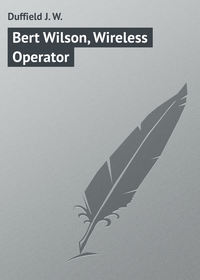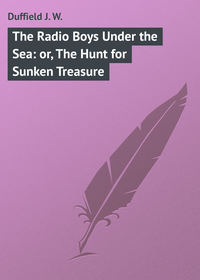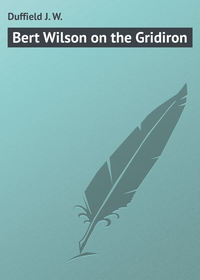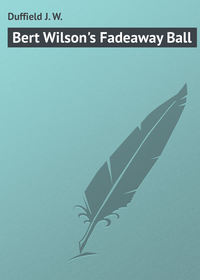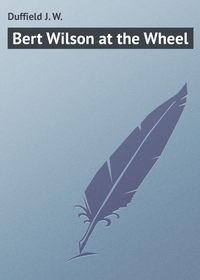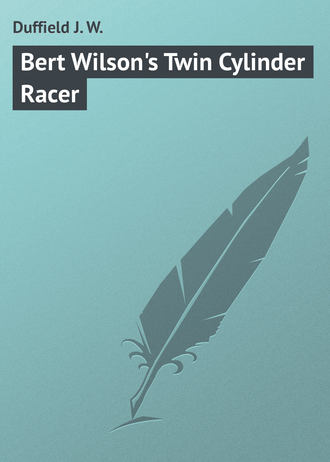 полная версия
полная версияBert Wilson's Twin Cylinder Racer
Soon, however, he realized that “the game was up.” The rain was coming down now in torrents, and he was wet to the skin. And with the rain came darkness so thick as “almost to be felt.” Then a flash of lightning rent the sky, and a terrific crash of thunder warned him that the storm was on in earnest.
He looked about him for some place of shelter. But there was nothing in sight, not even one of the little cabins, of whose hospitality he would so gladly have availed himself. The lightning came so fast now that the sky was aflame with it, and the thunder was continuous and deafening. He did not dare to seek shelter under the trees, and, in the open, the steel and iron of his motorcycle might easily attract a lightning stroke.
As he looked about him in perplexity, a peculiarly blinding flash showed him a little shack at the top of the hill he had been climbing when the storm had broken. It was only a few rods ahead of him, and, with a feeling of immense relief and thankfulness, he made for it. There was no light coming from it, and he did not know whether it was inhabited or abandoned. But, in either case, it was shelter from the fierceness of the storm, and that was enough.
Leading the wheel from which he had dismounted, he climbed the intervening space and rapped at the door. He waited an instant and then knocked again. Still there was no answer and after pausing a moment, he pushed open the door, that had no latch and yielded to his touch, as he stepped inside.
At first, coming from the outer air, he could only make out the outlines of the single room, of which the cabin seemed to consist. He called out, but there was no response. Then he rummaged in his tool box, and got out a bit of candle that he had provided for an emergency. From a waterproof pouch in his khaki suit, he produced a match and lighted the candle. Then, as the flickering light grew into a steady flame, he was able to take stock of his surroundings.
As he had surmised on his entrance, there was only a single room. The floor was of dirt, and the shack had been simply slung together in the rudest kind of a way. There was a small table of unplaned boards and a stool, from which one of the three legs was missing. A bunk in the corner and a tattered blanket completed the entire outfit of the temporary shelter in which Bert had so unexpectedly found himself.
It might have been a cabin formerly dwelt in by one of the “poor whites” of the mountains, or possibly a hunter’s shack that served at intervals for a temporary camp. At all events, it was shelter, and, in his present wet and desperate condition, Bert was not inclined to “look a gift horse in the mouth.”
“It isn’t exactly the Waldorf-Astoria,” he thought to himself, as he brought his motorcycle in out of the pounding rain, “but it surely looks mighty good to me just now.”
There was a rude fireplace at one side and some wood and kindling left by the previous occupant, and it was only a few moments before a cheery blaze gave an air of comfort to the small interior. After the fire was well started, Bert took his wet garments one by one and dried them before the fire. In a little while he was snug and dry, and inclined to look philosophically on the day that had had such an unlooked for ending. He even chuckled, as he looked at the speedometer and found that it registered over two hundred and fifty miles. He at least was nearly up to his schedule, in spite of the rain, and to-morrow was “a new day.”
“It might easily have been worse,” he thought. “Suppose it had rained that way this morning, instead of holding off as long as it did. I’ve cleared the Eastern States, at any rate, and am at last ‘down South.’”
As a precaution, when he stopped at Washington, he had secured a few sandwiches and a can of sardines. These he put out on the rough table, and, as hunger is always “the best sauce,” he enjoyed it hugely. There wasn’t a crumb left, when at last he leaned back contentedly and stretched his legs before the fire.
“Like Robinson Crusoe, I’m master of all I survey,” he mused. “Not that my kingdom is a very extensive one,” as he looked about the little room, that he could have covered with one jump.
The rain still kept on with unabated fury, but the harder it poured, the more cozy the shack seemed by contrast.
“Guess you and I will have to bunk it out together, old chap,” he said, addressing his faithful wheel. “Well, I might easily find myself in worse company. You’re a good old pal, if there ever was one.”
He took from his kit some oiled rags and together with some old gunny sacking that he found in a corner, started to clean the machine. The mud with which it was caked made this a work of time, as well as a “labor of love,” and two hours wore away before he had concluded. But it was a thorough job, and, by the time he was through, the “Blue Streak” was as bright and shining as when it faced the starter at noon on the day before.
While he was at work, Bert at times seemed to hear something that sounded like the roar and dash of waves. But he dismissed this as absurd. It was probably the splashing of the water, as it ran down the gullies at the side of the road. He was far above the level of lake or pond, and there was nothing on his map to indicate the presence of any considerable body of water in that locality. Once he went to the door, a little uneasily. But in the pitch darkness, all he could see was the lights of a little town, far down the valley. He told himself that he was dreaming, and, after promising himself an early start on the following morning, he stretched himself out on the little bunk in the corner, and in a few minutes had fallen into a deep and refreshing sleep.
CHAPTER VI
The Broken Dam
How long he slept he did not know, but, while the cabin was still shrouded in darkness, he woke suddenly and sat upright, as though in response to a voice that called.
He looked about him, unable at first to realize where he was. Then, as he reached out his hand, it came in contact with the motorcycle, which he had stood at the head of the bunk. His sleepy brain cleared, and the events of the day before – the storm – the deserted cabin – came back to him. He struck a match and glanced at his watch. It was a little after four, and, promising himself that he would not go to sleep again, he blew out the light and lay back in his bunk, planning out the ride for the day so near at hand.
But try as he would, he could not concentrate his mind on the subject in hand. Why had he awakened so suddenly? It was wholly apart from his ordinary habit. Usually he slept like a log, and, like a healthy animal, came slowly out of sleep. But this time it had been with a jump. He told himself that it was probably due to his unusual surroundings, and again tried to pin himself down to his schedule. But a vague sense of uneasiness would not vanish at his bidding. He felt as though some monstrous danger was threatening. Something direful and evil was in the air. In vain he called himself an “old woman,” and laughed, a little uncertainly, at his fears. The subtle threat persisted.
He had never had a strong premonition of danger that had not been justified. He was high strung and sensitively organized, and warnings that would leave unstirred a duller mind rang in his consciousness like an alarm bell. He recalled how, at Panama, not long ago, he had been impressed by the same feeling of coming peril, when the plot to destroy the canal was rapidly coming to a head. It had been justified then. Why should he not trust it now?
He hesitated no longer. He hastily threw aside the old tattered blanket, hurried himself into his clothes and went to the door of the cabin.
The rain had ceased, although the water was still running in streams in the ditches that lined the road. Darkness yet held sway, but, in the East, he could see the gray fingers of the dawn. In the dimness, he looked about him, and, as his eyes became accustomed to the surroundings, he saw, at a little distance, the outlines of a great structure that lay level with the plateau on which the cabin stood.
With a few quick strides, he crossed the intervening space until he stood on the brink of a gigantic dam. Then he knew what was meant by the splashing and gurgling he had heard the night before.
Stretched out in front of him was an angry waste of swirling waters. It was yellow and turbid from the clay brought down by the mountain torrents that acted as feeders to the lake. Great tree trunks, tossed in the boiling waters, had been jammed against the edge, increasing the pressure, already great. Over the brink a cataract was falling, that grew in volume with each passing moment. Through crevices in the lower part of the structure, other streams were trickling.
To Bert, as with whitening face he looked upon the scene, it was evident that the dam was in danger of collapse. There had been very heavy rains in the preceding May, and the lake had been filled to capacity. The storm of the night before had probably developed into a cloudburst farther up in the mountains, and the floods that came down in consequence were putting it to a strain that had not been counted upon when the dam was built. It was none too strong originally – Bert could see masses of rubble that had been inserted in the structure in place of solid stone – and now the innocent were in danger of paying a fearful price for the carelessness or criminality of the builders.
It had become much lighter now, and, as he looked down at the valley below, he could dimly make out the outlines of the houses in the town. Human beings were sleeping there, serene and confident, men, women and children, babes in their mothers’ arms. And he alone knew of the terrible monster that at this moment was threatening to leap upon and destroy them.
He turned again to the dam. The crevices were wider now. A perfect torrent was pouring over the brink. Even while he looked, there was a great bulge in the central part, and a deluge burst through. Two of the capstones yielded and fell, with a noise that was drowned by the still greater roar of the unleashed waters. There was no longer any doubt. The dam was giving way!
With a sickening fear at his heart, he turned and raced for the cabin. A louder roar behind him added wings to his feet. He burst open the door, dragged out the “Blue Streak,” and in another moment was in the saddle and riding for dear life down the valley.
The mud was deep and at a curve of the road, his rear tire skidded and threw him, bruised and bleeding, a dozen feet in advance. But he felt nothing, thought of nothing but the unconscious sleepers who must be warned. Stumbling and shaken, he resumed his seat, and tore along the mountain road like the wind.
At the scattered farmhouses along the way, lights could be seen in the windows. Here and there, he passed farmers already at work in the fields. He blew his horn and yelled at these and pointed behind him. They cast one startled glance up the valley and then rushed to their houses.
He did not dare to look behind him, but he could hear a sullen roar that momentarily grew louder. He knew that the monster had broken its bonds and was abroad seeking for prey. He let out the last ounce of power that he possessed as he raced on to the sleeping town. He had ridden fast before, but never as he was riding now.
As he neared the town, he pulled wide open the siren that he only used on extraordinary occasions. It wailed out in a wild, weird shriek that spoke of panic, danger, death. There was no mistaking the meaning of that call.
Now he was in the outskirts, and frightened faces appeared at the windows while half-dressed men ran out of the doors. He waved his hand, and shouted at the top of his lungs:
“The dam has broken. Run for your lives!”
The roar had now swelled into thunder. The flood was coming with fearful velocity. No more need of his siren. That hideous growl of the tumbling waters carried its own warning.
The path on which Bert had been riding wound along the side of the hill to the east of the town. Corresponding slopes lay on the other side. The dwellers on the sides of the hills were comparatively safe. It was unlikely that the water would reach them, or, at any rate, they could climb still higher up and escape, even if their houses were washed away. But there was no hope for the buildings in the valley itself. They were right in the path of the onrushing flood and would be swept away like so many houses of cards. Nothing could resist that pitiless torrent now less than a mile away.
Bert leaped from his wheel and dragged it into a thicket at the side of the path. He cast a swift look up the valley. A great foaming wall of yellow water, forty feet high, bearing on its crest gigantic tree trunks and the debris of houses it had picked up in its path, was bearing down on the town with the swiftness of an avalanche.
The houses were emptying now and the streets were full of frantic people, fleeing for their lives. Bert heard the hoarse shouts of the men, the screams of the women, the wailing of little children roused suddenly from sleep. From every door they poured forth, making desperate efforts to reach the higher ground. The air resounded with the shrieks of those driven almost mad by sudden terror.
Into that pandemonium Bert plunged with the energy of despair. The time was fearfully short and the tumult of the coming flood was like the thunder of Niagara. He met a mother with a babe in her arms and two crying children holding to her skirts. He grabbed the little ones up and with a tousled little head under each arm placed them in safety. A crippled boy, hobbling painfully along on crutches, felt himself suddenly lifted from the ground and hurried to the hillside. He was here, there and everywhere, guiding, pointing, encouraging. And then, just as he was stooping to lift up a woman who had fainted, the flood was upon him!
It struck the doomed town with the force of a thunderbolt. Frame houses were picked up and carried along like straws. Brick structures were smashed into fragments. It was a weltering chaos of horror and destruction.
When that mountainous mass of water crashed down upon him, Bert for a moment lost consciousness. It was like the impact of a gigantic hammer. There was an interval of blackness, while the water first beat him down and then lifted him up. He had a horrible strangling sensation, and then, after what seemed ages of agony, he found himself on the surface, striking out blindly in that churning mass of water that carried him along as though in a mill race. He had never before realized the tremendous power of water. He was a mere chip tossed hither and thither upon the waves. His head was dizzy from the awful shock of the first impact, there was a ringing in his ears, and the spray dashing into his eyes obscured his sight. Almost mechanically, he moved his hands and feet enough to keep his head above the surface. Gradually his mind became clearer, and he could do some connected thinking.
At any rate, he was alive. That was the main thing. Although sore and bruised, he did not think that any of his bones were broken. He was an expert swimmer, and knew that if he kept his senses he would not drown. His most imminent danger lay in being struck by a tree trunk or jammed between the houses that were grinding each other to pieces. If this should happen, his life would be snuffed out like a candle.
Even at that moment of frightful peril, one thing filled his heart with gladness. He felt sure that almost all the townspeople had escaped. Here and there, he could see some one struggling like himself in the yeasty surges, or clinging to some floating object. Once the body of a man was carried past within a few feet of him. His last conscious glance before the flood overwhelmed him had shown him a number who had not yet reached the higher ground. These had been caught up with him, and some no doubt had perished. But he thanked God that hundreds, through his warning, had found shelter on the hillsides. Their property had been swept away, but they had retained their most precious possession.
The loss in animal life was heavy. Bert groaned, as he saw the bodies of cows and horses and dogs tossed about in the raging waters. Not far off, a horse was swimming and gallantly trying to keep his head above water. His fear-distended eyes fell on Bert, and he whinnied, as though asking for help. But just then a great log was driven against him, and with a scream that was almost human he went under.
And now Bert noted that the force of the flood was abating. It had reached the lowest part of the valley, and, ahead of him, the ground began to rise. With every foot of that ascent the torrent would lose its impetus, until finally it would reach its limit.
But there a new danger threatened. There would be a tremendous backwash as the current receded, and in the meeting of the two opposing forces a terrific whirlpool would be generated, in which nothing human could live. In some way he must reach the shore before the flood turned back.
There was not an instant to lose, and he acted with characteristic decision. The torrent was slackening, and he no longer felt so helpless in its grasp. He could not swim at right angles to it and thus approach the shore directly, but must try gradually to pull to the left, in a long diagonal sweep. Inch by inch, he drew away from the center of the stream and slowly neared the bank. Twice he had to dive, to avoid tree trunks that dashed over the spot where he had been a moment before. Once he barely escaped being caught between two houses. But his quick eye and quicker mind stood him in good stead, at this hour of his greatest need. His lungs were laboring ready to burst and his muscles were strained almost to the breaking point. But his long powerful strokes brought him steadily nearer to the eastern bank and he steered straight for a huge tree, that stood on the edge of the rushing waters. He missed it by a foot, but was just able to grasp a trailing branch as he was swept beneath it. A desperate clutch, a quick swing upward and the ravening waters had been cheated of a victim. Slowly he made his way over the bough to the trunk of the tree, and fell, rather than dropped, to the ground. Utterly exhausted, he crumpled into a heap and lay there gasping.
He had escaped death by the narrowest of margins. Even while he lay there, bereft of strength and worn out with struggle, the flood reached its limit, paused a moment and then rushed back. The receding current met the other still advancing. Like giant wrestlers, they locked in a fierce embrace, and the waves shot up for thirty feet. Great logs flew out of the waves and fell back with a resounding crash. Had Bert been in the center of that seething maelstrom, nothing could have saved him from instant death.
But he was safe. He had gone into the very jaws of death and come out alive. Spent and wrenched and bruised he was, and weary beyond all telling. Each arm and leg felt as though it weighed a ton. But he had never incurred pain or danger in a worthier cause, and he rejoiced at the chance that had impelled him to take up his quarters in the deserted hut the night before. The rain had assuredly been a “blessing in disguise,” bitterly as he had regretted it at the time.
A full hour elapsed before he was able to get on his feet. Had it not been for his splendid physical condition, he would have utterly collapsed under the strain. But soon his heart resumed its normal rhythm, the blood coursed more strongly through his veins, and he struggled up from his recumbent posture and began to take note of his surroundings.
How far he had been carried in that wild ride, he had no means of knowing. But he judged that he must be fully six miles from the site of the town. There had been several turnings in the valley and from where he stood looking back, he could not see more than a mile before a bend in the road cut off his view. But the stream itself was sufficient guide as he retraced his steps, and he knew that all too soon he would reach the sad and stricken crowd that would be camped on the banks, bewailing the calamity that had come upon them with the swiftness of a lightning stroke.
He looked at his watch. It had stopped at ten minutes to five, probably just at the second that the mountain of water swooped down upon him. He threw a glance at the sun which was only a little above the horizon, and concluded that it was not much more than six o’clock. Scarcely more than an hour had passed, but it seemed to him as though ages had elapsed since the moment when he had been startled by that first premonition of danger.
How lucky that he had heeded it! Had he obeyed his first impulse and disregarded it, he would have been compelled to stand by, a helpless spectator, and see a whole community wiped out of existence. And the bitter memory of that neglected opportunity would have cast its shadow over him as long as he lived.
His thoughts went now to the gallant machine that had carried him so swiftly to the work of rescue. Good old “Blue Streak!” Once more it had proved a tried and trusty comrade, responding to every call he made upon it. How quickly the miles would fall away behind him if he only bestrode it now.
The wish had scarcely been formed before a substitute appeared. He heard the sound of wheels, and a team came up behind him. The man who was driving told Bert to jump in, and whipped up his horses as he hurried on to the scene of the disaster.
Soon they came upon the homeless throng, huddled upon the slope that overlooked what had been home. Some were weeping and running about, half crazed with anguish. Others were dry-eyed and dumb, moving as though in a dream, their minds paralyzed by the shock. They needed everything, food and tents and medicines and doctors and nurses. The telegraph and telephone service was out of commission and the offices had been swept away. The outside world knew nothing, as yet, of the frightful visitation that had come to the little town, nestling in the West Virginia hills.
Bert’s resolution was taken on the instant. There was nothing more that he could do here. Little, in fact, could be done until the flood subsided, and there were plenty of hands only too willing to dull their heartache in work that would keep them from brooding too much on the disaster. But no horse could get to the world without as quickly as he on his motorcycle. He waited only long enough to learn the shortest route to the next town of any size. Then he rushed to the thicket on the hillside where he had left his wheel, and was rejoiced to find it safe. Fortunately, it had been beyond the high water mark of the flood. He dragged it out, mounted, and, with one last look at the waters that had so nearly been his grave, threw in the clutch and started up the valley.
The sun was much higher now and the roads, while still muddy, were rapidly drying out. He cleared the summit of the hills and could see far off the buildings and spires of the town he sought. Like a meteor, he shot down the slope, and in a few minutes was the center of an excited group in the telegraph office, to which he at once repaired. Soon the wires were humming, and within a short time the entire country, from Maine to California, was stirred to the depths by the news of the calamity. Doctors and supplies were rushed from the points nearest to the stricken town and from Washington the Federal Government sent a squad of Red Cross nurses and a detachment of troops to take charge of the work of rescue and reconstruction.
Only one thing was omitted from Bert’s graphic recital of the story. He said not a word of his wild ride in the early dawn. Others, later on, when they had regained something of composure and could recall events preceding the catastrophe, remembered a rider rushing along the country roads and calling upon them to flee for their lives. They told of the siren, shrieking like a soul in pain, that had roused them from their sleep with its dreadful warning. The reporters, avid of sensation, listened eagerly, and embroidered upon the story some fanciful embellishments of their own. They did their utmost to discover the name of the rider who had come racing through the mists of that early morning, but failed. The only one who could tell the truth about it never did. Except to a few of his intimates, and that under the pledge of secrecy, Bert locked the story in his own breast and threw away the key. It was enough for him that he had been able at a critical juncture to do, and do successfully, the work that stood ready to his hand. The deed carried its own compensation, and he rejoiced that he was able to keep it from public view. But, somewhere in West Virginia, a crippled boy remembered him gratefully, and two little youngsters were taught to mention a nameless stranger in their prayers.



